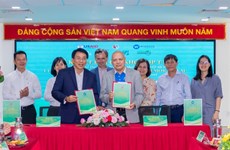Concerns raised about adverse impacts of hydropower projects on Mekong
Developing mainstream hydropower projects on the lower Mekong River could lead to long-term and unrecoverable losses to its deltas and the water environment, impacting millions of people.
 The Hau River, a main tributary of the Mekong River, traverses Vietnam's An Giang and Dong Thap provinces (Photo: VNA)
The Hau River, a main tributary of the Mekong River, traverses Vietnam's An Giang and Dong Thap provinces (Photo: VNA)HCM City (VNA) – Developing mainstream hydropower projects on the lower Mekong River could lead to long-term and unrecoverable losses to its deltas and the water environment, adversely impacting the livelihoods of millions of people in the region.
The warning was issued in a study on impacts of mainstream hydropower on the Mekong River released at a workshop in Ho Chi Minh City on December 4.
The function attracted more than 70 Vietnamese and foreign scholars, scientists and managers. It was also attended by representatives from international and non-governmental organisations, the Mekong River Commission, and the Mekong River committees of Laos and Cambodia.
Vietnamese Deputy Minister of Natural Resources and Environment Nguyen Thai Lai, who is also the deputy head of the Vietnam National Mekong River Committee, said the proposed building of 11 hydropower projects on the mainstream of the lower Mekong River in Laos, Thailand, Cambodia and Vietnam is raising concerns over possible negative impacts on the environment, economy and society in the riverside countries, especially in the river deltas of Cambodia and Vietnam.
The study made it clear that the operations of mainstream hydropower projects could result in a 65 percent nosedive in the alluvium, mud and nutrition volume in Cambodia’s Krache and Vietnam’s Tan Chau and Chau Doc, and a sharp decline in biological and agricultural productivity.
Meanwhile, erosion, deposition in riverside and coastal areas, and saltwater intrusion will become more serious.
Mainstream hydropower facilities are forecast to obstruct the movement of fish and other migratory aquatic species, making the total fish haul fall dramatically – by up to 50 percent – in Vietnam and Cambodia, where a majority of delta residents are directly or indirectly relying on fisheries for their livelihood.
Such projects are likely to trigger the disappearance or even extinction of up to 10 percent of fish species in Vietnam and Cambodia along with a decrease in the numbers of other aquatic species.
The report adds that the Mekong deltas hold unique natural values at both national and international levels. Mainstream hydropower could undermine all the existing values.
Additionally, about 3,400 tonnes of phosphate in the Mekong deltas will disappear every year due to hydropower dams, costing local resident 24 million USD a year to buy fertiliser to replace.
Vietnam could lack 2.4 million tonnes of mud and 0.02 million tonnes of clay every year, leading to a 2.3 – 2.5 percent drop in the rice output and a 21 – 22 percent reduction in the corn output annually. As a result, the country would have to buy a great amount of fertiliser to replace those natural elements.
Meanwhile, 12.3 million tonnes of mud and 0.2 million tonnes of clay are predicted to not flow into Cambodia a year, according to the report.
At the workshop, participants said the countries that the Mekong River traverses should conduct all-round analyses on hydropower dams’ locations and consider relocating some dams to simultaneously ensure hydropower benefits and minimise impacts on the mainstream river and its deltas.
Some experts called on certain facilities not to be built in the downstream areas, while dams should be constructed on tributaries instead of the mainstream. They also said dams must be designed appropriately to ensure the movement of alluvium, mud and sand management strategies as well as the habitat of aquatic species.
Several opinions urged for the connection of the Mekong deltas by fine-tuning the design and operations of their flood-control facilities to facilitate the movement of fish and applying non-structural measures to make up for losses caused by water level and salinity changes.
The study unveiled at the workshop was conducted with the coordination of the Lao and Cambodia Governments, Denmark’s DHI group, the US’s HDR company, and World Bank specialists. It is expected to be given to the Mekong River Commission and the member countries for the consideration of overhauling mainstream hydropower development plans.-VNA













